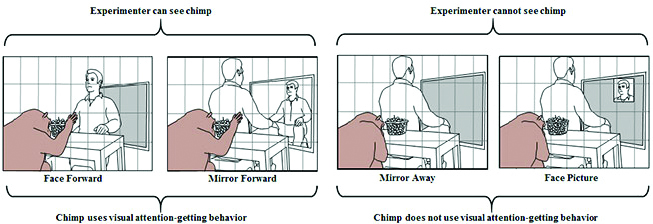
Brooklyn College Philosophy Department Chairperson and Professor Robert Lurz has apparently made a significant breakthrough in the field of animal cognition. He’s devised a cognitive experiment using chimpanzees to determine to what extent they possess consciousness, and whether they’re capable of putting themselves into the heads of other beings.
Researchers like Lurz have endeavored to better understand whether a given animal species can recognize or attribute emotions to others, and whether they can use that knowledge for practical purposes. These respective lines of philosophical study have come to be called “perspective-taking” and “theory of mind.”
Until recently, theory of mind researchers were uncertain whether chimpanzees could tell if they were being watched, and whether they communicate and manipulate others accordingly.
According to Professor Lurz, his research has indicated such to be the case.
In the test he created, a chimpanzee is enclosed in a compartment behind a human experimenter. The chimp only beckons for attention when the human experimenter faces toward the chimp, not when the experimenter turns away, indicating there was some understanding that the experimenter has to see the chimp in order to respond to its gestures.
Here’s the catch – when the experimenter is turned towards a mirror that has both themselves and the chimpanzee in view, the chimp will continue to seek the human’s attention. This demonstrates an understanding of how mirrors work, and an awareness that the human could still see them. Lurz and other researchers believe the chimps determined that they were visible to the human by projecting their own experiences with mirrors onto the human – evidence that chimpanzees are capable of perspective-taking.
Why are the chimps able to have these complex thoughts? It might have something to do with language.

“Language is a very special form of communication,” Lurz said. He notes that the capability of a given species to know and use language weighs significantly on their own cognitive thought process, and can reflect other possibilities of formulating other complex thoughts.
“Without the structure of language you, yourself an animal, could not have a complex structure thought,” Lurz said. “You would have a very simple one, like saying ‘food there,’ rather than a complex one, where you could go ask, ‘if there was food there, I would do something differently than I am doing now.’”
“The philosophical argument is that without that kind of structure, animals would be limited in the kinds of thoughts that they could possibly have.”
As the closest related species to humans, chimpanzees have demonstrated to researchers a knack for learning language, much more so than other primates closely related to humans. In 2007, one chimpanzee named Washoe was able to learn up to 350 words in American Sign Language.
Given the close proximity of the genealogical link between humans and chimpanzees, as well as our mutual capability of understanding language, the study’s data raises several questions as to what the said information might tell humans about ourselves.
For researchers involved in these studies with chimpanzees, it raises the question of whether our ability to interpret language and empathize with others arose from a common ancestor between humans and apes. If so, it would be clear that those abilities did not evolve with the modern human species.
Professor Lurz theorizes that such abilities provided early primates an advantage in an evolutionary context.
“Maybe there was some great advantage, to be able to know what you’re thinking or what you’re planning,” Lurz theorized. “Maybe that will help me survive or reproduce better, by being able to anticipate your behavior, by being able to figure out what’s going on in your mind.”
Professor Lurz says that he now plans to move from studying chimpanzees to studying human children. His focus is on four-year-olds, who are around the age where it is expected they similarly develop such an understanding of language.
He is awaiting approval for the project on ethical grounds, and anticipates he will need a substantial research partnership to secure the funding and equipment needed to conduct further experiments.
For Professor Lurz, there is yet another philosophical question that continues to intrigue himself and some of his peers. Those who study “philosophy of mind” seek to answer: if everyone around you is really self-aware and conscious, how does one go about to prove it?
“Let’s suppose we can know that others have minds, I can know that you feel sad, I can know that you see something,” raised Lurz. “The question is, how do I prove it, how do I figure it out? I still have behavior to go on, but going from behavior to hypothesis, what makes that hypothesis to be more likely to be true rather than false?”
